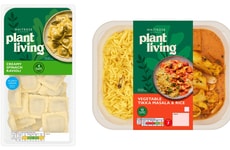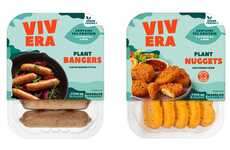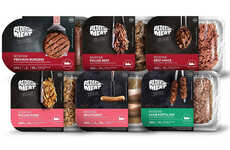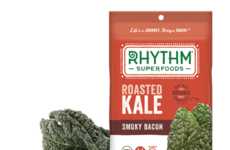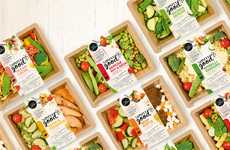
Waitrose Created Plant-Based Products with The Vegetarian Butcher
Laura McQuarrie — October 26, 2017 — Lifestyle
References: waitrose & plantbasednews.org
In response to a heightened demand for plant-based, meatless products, UK supermarket chain Waitrose is increasing its store space for vegan and vegetarian offerings by 35%. As part of its effort to dedicate more retail space to the sales of plant-based products, Waitrose partnered with The Vegetarian Butcher to develop what it calls "a new soya protein." This new high-quality protein substitute is being touted for a texture that is akin to meat.
With The Vegetarian Butcher, Waitrose is introducing 30 new dishes to its own private label range, which includes beetroot burgers, rainbow vegetable stew, heat-and-eat lasagna, cauliflower cheese croquettes and vegan-friendly options like fresh tofu.
Looking ahead to the future, Waitrose is anticipating that the demand for meat-free foods will only continue to rise over the next decade.
With The Vegetarian Butcher, Waitrose is introducing 30 new dishes to its own private label range, which includes beetroot burgers, rainbow vegetable stew, heat-and-eat lasagna, cauliflower cheese croquettes and vegan-friendly options like fresh tofu.
Looking ahead to the future, Waitrose is anticipating that the demand for meat-free foods will only continue to rise over the next decade.
Trend Themes
1. Increased Demand for Meatless Products - The growth in demand for meatless products is an opportunity for the food industry to innovate by developing new plant-based substitutes with similar textures to meat.
2. Expansion of Vegan and Vegetarian Offerings in Supermarkets - The expansion of vegan and vegetarian offerings by retailers offers an opportunity for food manufacturers to create new plant-based product lines for this market.
3. Partnerships to Develop Meatless Proteins - Collaborations between retailers and producers to develop new meatless proteins, such as Waitrose's partnership with The Vegetarian Butcher, presents an opportunity for the food industry to create more plant-based products that appeal to consumers looking for sustainable and ethical choices.
Industry Implications
1. Food Retail - The growth in demand for meatless products presents an opportunity for retailers to expand their vegan and vegetarian offerings and create more space in-store dedicated to plant-based products.
2. Food Manufacturing - The demand for meatless products presents an opportunity for food manufacturers to create new product lines and develop innovative plant-based substitutes with similar textures to meat.
3. Protein Production - The need for meatless proteins, such as Waitrose's new soya protein, presents an opportunity for producers to develop new plant-based proteins that meet consumer needs for texture and flavor while also being sustainable and ethical.
1.8
Score
Popularity
Activity
Freshness

